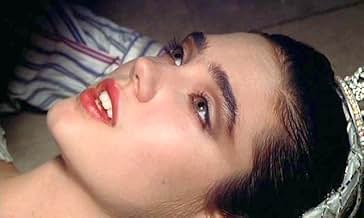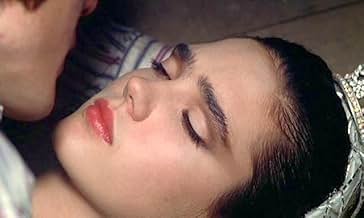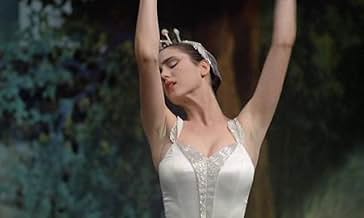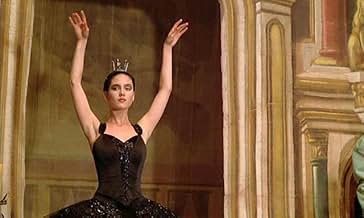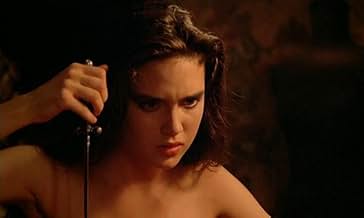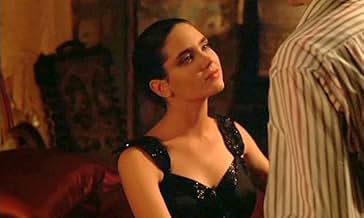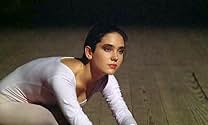Young American ballerina enrolls in a prestigious ballet school in Hungary. She suddenly becomes inexplicably obsessed with Tchaikovsky's Swan Lake and her personality completely changes. A ... Read allYoung American ballerina enrolls in a prestigious ballet school in Hungary. She suddenly becomes inexplicably obsessed with Tchaikovsky's Swan Lake and her personality completely changes. A young man in love with her investigates.Young American ballerina enrolls in a prestigious ballet school in Hungary. She suddenly becomes inexplicably obsessed with Tchaikovsky's Swan Lake and her personality completely changes. A young man in love with her investigates.
- Awards
- 1 win & 1 nomination total
Featured reviews
A subtle, slow-paced Italian horror film --where the horror is mostly implied rather than overt-- about a ballerina who flies to Italy to try out for an exclusive ballet school and instead becomes lost in a surreal world where time stands still for a hundred year old ballet company, it's long closed theater, and it's diabolical director.
WARNING: DESCRIPTIONS CONTAINS NUMEROUS SPOILERS:
Jason (Gary McCleery), who is working for his cantankerous uncle Joshua (Charles Durning), sees the hauntingly beautiful Claire (Jennifer Connelly) as she climbs the stairs to her hotel room and drops a single ballet slipper behind her. In a Cinderella moment Jason hands her the slipper, introduces himself, and from that moment on he becomes obsessed with her to an almost unhealthy degree. Jason is so distracted by her, that he abandons his uncle in the middle of an important auction of antique clocks when he sees Claire sight-seeing in the auction hall (the clock theme is obviously a reference to the idea that time has stood still, or has become, at the very least, fluid here in this town, an idea further underscored by a scene where Jason wakes up late for work because the array of antique clocks in his hotel room all have the wrong time). In a scene which almost looks as if it was plucked (or "borrowed") from the film "Flashdance," Claire arrives for her ballet audition, looks at all the other girls nervously, peeks through the audition room door and sees how difficult its going to be, then becomes even more nervous when she hears the rejected ballerina's tearful account of how poorly she was treated. Claire freezes when they call her name and does not respond. She then gathers her things and leaves quickly. Unfortunately, in her panic and haste, she becomes lost in the theater and ends up standing in the gloom of the main stage where she puts on an impromptu performance (done by a double, not Connelly) which is witnessed by the tormented and haggard looking Marius Balkan (Laurent Terzieff). He says the name "Natalie" and Claire freezes. When he drops his cane she runs away. And so is set in motion a new and strange turn of events, where Claire becomes haunted by a past that is not her own (or is it?). When wandering the city with Jason she finds an old mansion that seems familiar. She knows exactly where the spare key is hidden and enters the house where she discovers numerous effigies of swans and paintings all of which reference "Swan Lake," the ballet which she has told Jason is her absolute favorite. The next time Jason sees her in the park by the mansion, she is sitting alone in an old fashioned dress, watching the swans swim on the pond. She no longer responds to the name Claire. And in a moment of unintentional humor, the otherwise brilliant composer Jurgen Knieper makes the most unfortunate choice to use a tremolo string motif that sounds exactly like the "Twighlight Zone" theme just as Claire reveals that her name is not Claire, but "Natalie."
From this point on the story focuses on Jason's struggle to bring Claire back to reality, and his eventual discovery that she's not, as he first thinks, confused or insane, but rather there are powerful and dark supernatural forces in play. He discovers Natalie was a dancer who died long ago after she fled a performance of "Swan Lake" and the ballet's director, Marius, has been alive for at least a hundred years. Jason must now try to save Claire from the sinister ballet.
There are many scenes in this film that could have been cut to make the movie flow better, and there are many edits within scenes which could have been made to make the flow tighter. And there is one bizarre and surreal moment during the climax of the film, which I will not reveal, which will either leave the viewer in riotous laughter from the unintentional humor of the situation, or will leave the viewer confused and ripped out of any sense of any kind of reality, or subtle sur-reality, that the film had maintained to that point.
Overall the film is pretty much a failure. It's too slow, too vague, and too unfocused in its mission. Other Italian horror directors suffer this same problem (i.e. Argento and Bava) but those directors make up for the lack of focus and clear direction by drenching their films in artistic style. "Etoile" lacks this style, and so everything rests on the shoulders of the story, and the actors. Unfortunately the story is flawed and the actors are all sorely lacking in strong direction from the director. Gary McCleery as Jason is too over the top in his obsession with Claire and comes off a little bit stalker-ish at moments. Connelly is trying to play her character as dreamy and almost childlike, but with no apparent solid direction from Del Monte she ends up looking lost in her part. Horror fans, and fans of Italian horror will probably be more likely to at least partially enjoy the experience of viewing this film, but the casual film viewer will most likely be bored to tears. Fans of Jennifer Connelly might enjoy it purely because she looks so ethereally beautiful throughout the film (her features caught here in-between her earlier "lolita" looks and her later refined beauty). And good luck finding a copy. Thus far it has only been released in Japan on VHS.
WARNING: DESCRIPTIONS CONTAINS NUMEROUS SPOILERS:
Jason (Gary McCleery), who is working for his cantankerous uncle Joshua (Charles Durning), sees the hauntingly beautiful Claire (Jennifer Connelly) as she climbs the stairs to her hotel room and drops a single ballet slipper behind her. In a Cinderella moment Jason hands her the slipper, introduces himself, and from that moment on he becomes obsessed with her to an almost unhealthy degree. Jason is so distracted by her, that he abandons his uncle in the middle of an important auction of antique clocks when he sees Claire sight-seeing in the auction hall (the clock theme is obviously a reference to the idea that time has stood still, or has become, at the very least, fluid here in this town, an idea further underscored by a scene where Jason wakes up late for work because the array of antique clocks in his hotel room all have the wrong time). In a scene which almost looks as if it was plucked (or "borrowed") from the film "Flashdance," Claire arrives for her ballet audition, looks at all the other girls nervously, peeks through the audition room door and sees how difficult its going to be, then becomes even more nervous when she hears the rejected ballerina's tearful account of how poorly she was treated. Claire freezes when they call her name and does not respond. She then gathers her things and leaves quickly. Unfortunately, in her panic and haste, she becomes lost in the theater and ends up standing in the gloom of the main stage where she puts on an impromptu performance (done by a double, not Connelly) which is witnessed by the tormented and haggard looking Marius Balkan (Laurent Terzieff). He says the name "Natalie" and Claire freezes. When he drops his cane she runs away. And so is set in motion a new and strange turn of events, where Claire becomes haunted by a past that is not her own (or is it?). When wandering the city with Jason she finds an old mansion that seems familiar. She knows exactly where the spare key is hidden and enters the house where she discovers numerous effigies of swans and paintings all of which reference "Swan Lake," the ballet which she has told Jason is her absolute favorite. The next time Jason sees her in the park by the mansion, she is sitting alone in an old fashioned dress, watching the swans swim on the pond. She no longer responds to the name Claire. And in a moment of unintentional humor, the otherwise brilliant composer Jurgen Knieper makes the most unfortunate choice to use a tremolo string motif that sounds exactly like the "Twighlight Zone" theme just as Claire reveals that her name is not Claire, but "Natalie."
From this point on the story focuses on Jason's struggle to bring Claire back to reality, and his eventual discovery that she's not, as he first thinks, confused or insane, but rather there are powerful and dark supernatural forces in play. He discovers Natalie was a dancer who died long ago after she fled a performance of "Swan Lake" and the ballet's director, Marius, has been alive for at least a hundred years. Jason must now try to save Claire from the sinister ballet.
There are many scenes in this film that could have been cut to make the movie flow better, and there are many edits within scenes which could have been made to make the flow tighter. And there is one bizarre and surreal moment during the climax of the film, which I will not reveal, which will either leave the viewer in riotous laughter from the unintentional humor of the situation, or will leave the viewer confused and ripped out of any sense of any kind of reality, or subtle sur-reality, that the film had maintained to that point.
Overall the film is pretty much a failure. It's too slow, too vague, and too unfocused in its mission. Other Italian horror directors suffer this same problem (i.e. Argento and Bava) but those directors make up for the lack of focus and clear direction by drenching their films in artistic style. "Etoile" lacks this style, and so everything rests on the shoulders of the story, and the actors. Unfortunately the story is flawed and the actors are all sorely lacking in strong direction from the director. Gary McCleery as Jason is too over the top in his obsession with Claire and comes off a little bit stalker-ish at moments. Connelly is trying to play her character as dreamy and almost childlike, but with no apparent solid direction from Del Monte she ends up looking lost in her part. Horror fans, and fans of Italian horror will probably be more likely to at least partially enjoy the experience of viewing this film, but the casual film viewer will most likely be bored to tears. Fans of Jennifer Connelly might enjoy it purely because she looks so ethereally beautiful throughout the film (her features caught here in-between her earlier "lolita" looks and her later refined beauty). And good luck finding a copy. Thus far it has only been released in Japan on VHS.
This has been getting a belated reputation (I admit to being totally unfamiliar with it prior to a recommendation from a Maltese friend of mine last week!) as a sort of dry-run for one of last year's most acclaimed films, BLACK SWAN. In fact, it similarly deals with a young and beautiful ballerina whose life is inextricably altered when she applies for the starring role of the famous Tchaikovsky opus "Swan Lake" (though here everything eventually works its way to a happy ending).
While it does not go into the psychological avenues taken by Darren Aronofsky's recent effort, the film nonetheless plays out like a Kafkaesque thriller – with the two protagonists (the hero is a likable fellow American who happens to stay on the same floor of her Budapest hotel) sucked in by a vortex of surreal events that literally transcends the passage of time! If anything, ETOILE also recalls Hitchcock's VERTIGO (1958) in equal measures, as ageing and crippled impresario/dancer(!) Laurent Terzieff moulds leading lady Jennifer Connelly (still in her Euro-fantasy phase that had kicked off with Dario Argento's typically elaborate PHENOMENA [1984] and also comprised Jim Henson's kiddie film LABYRINTH [1986]) into a prima ballerina from a past age who had perished tragically after a performance. Interestingly, 17 year-old Connelly – though she is meant to be spell-bound and, thus, also unable to recognize the young man – slips into the intricacies of her dual role much more easily than Natalie Portman in BLACK SWAN!
A dilapidated country-house also plays a central part in the 're-enactment' – where the male lead (whose life had until then been controlled by art-collecting uncle Charles Durning, who is himself mysteriously hypnotized at one point, gets violent towards his relative and hit by a passing car!) eventually goes to meet the evil head-on just as the Tchaikovsky ballet is being played out on stage. He has to fight with a giant black swan which, when he kills, Terzieff falls dead in mid-performance elsewhere! In the end, while hardly a lost classic, this is a reasonably interesting (and stylish) effort, regardless of the BLACK SWAN connotations which will probably be attributed to it from here on in
While it does not go into the psychological avenues taken by Darren Aronofsky's recent effort, the film nonetheless plays out like a Kafkaesque thriller – with the two protagonists (the hero is a likable fellow American who happens to stay on the same floor of her Budapest hotel) sucked in by a vortex of surreal events that literally transcends the passage of time! If anything, ETOILE also recalls Hitchcock's VERTIGO (1958) in equal measures, as ageing and crippled impresario/dancer(!) Laurent Terzieff moulds leading lady Jennifer Connelly (still in her Euro-fantasy phase that had kicked off with Dario Argento's typically elaborate PHENOMENA [1984] and also comprised Jim Henson's kiddie film LABYRINTH [1986]) into a prima ballerina from a past age who had perished tragically after a performance. Interestingly, 17 year-old Connelly – though she is meant to be spell-bound and, thus, also unable to recognize the young man – slips into the intricacies of her dual role much more easily than Natalie Portman in BLACK SWAN!
A dilapidated country-house also plays a central part in the 're-enactment' – where the male lead (whose life had until then been controlled by art-collecting uncle Charles Durning, who is himself mysteriously hypnotized at one point, gets violent towards his relative and hit by a passing car!) eventually goes to meet the evil head-on just as the Tchaikovsky ballet is being played out on stage. He has to fight with a giant black swan which, when he kills, Terzieff falls dead in mid-performance elsewhere! In the end, while hardly a lost classic, this is a reasonably interesting (and stylish) effort, regardless of the BLACK SWAN connotations which will probably be attributed to it from here on in
It says so much about 'Swan Lake' that the ballet has appeared again and again in films that in any way revolve around the art form; save perhaps for the association of 'The Nutcracker' with Christmas, any average person who knows nothing else about dance is more likely to have heard about 'Swan Lake' than any other ballet. The choreography, score, and story are all legendary. Similarly, even when a specific work isn't being adapted or represented, cinema shows us again and again the enduring power of theater as countless films and TV shows have been set in and around the large complexes housing opera, dance, orchestral performances, and more. In all such regards and every which way, there's something both impressive and imposing about the architecture and the art that makes them perfect for the big screen. And so we have 'Etoile,' also known simply as 'Ballet,' with all this serving as perfect set-up for a tale of a young dancer and the strange goings on at a ballet school in Hungary. There's almost nothing about this picture that isn't altogether enchanting, and in some cases quietly unnerving. I think this is fantastic, and well worth exploring, and more than that - at the outset I was prepared to say it's not perfect, but now I'm inclined to think that gut reaction was sorely mistaken.
Substantial, meticulous care was clearly poured into every small facet of this feature, most of it geared toward successfully inculcating an uneasy, fanciful atmosphere - mystery, fantasy, thriller, even horror. Jürgen Knieper's original music alone does much to lend to that eeriness, bewitching yet disquieting themes that sound like something right out of a dark dream. Acácio de Almeida's cinematography is wonderfully fluid and mindful; along with very particular shot composition and use of lighting, the sense is only ever heightened of unnatural happenings, and more than that, it's as if our very presence as a spectator were an uninvited intrusion. This is to say nothing of Peter Del Monte's exceptional direction, orchestrating scenes with vibrant finesse; Giuseppe Crisolini Malatesta costume design, and the work of the hair and makeup artists, enriching the gloomy tale with fabulous, fetching small detail; the very filming locations, and the production design and art direction that dress them up, are simply beautiful. Zarko Prebil's choreography is exquisite, and so too are the performances of all on hand. By this point in her young career Jennifer Connelly was already making waves, and she again demonstrates why with a pointedly airy, spellbound and spellbinding display of tremendous subtlety and poise. Not to be outdone, even when they're not in a scene Laurent Terzieff and Olimpia Carlisi loom in the background like grim shadows, and their hushed presence is magnificent. Given roles of considerably more heightened emotions, it rather seems at times as though Gary McCleery and Charles Durning are overacting by comparison, yet there's a vitality in their performances that's just as great and essential to the weaving of this story. And it must be said: kudos as well to Raffaella Renzi, the dazzling dancer who stood in for Connelly as scenes required.
And that story! True, 'Etoile' is familiar in some capacity; in this moment I can't conjure a specific example, but the core of the narrative is something we've definitely seen before. One might also note that the climax is resolved a little too neatly, with the ending coming a bit abruptly - though in fairness, I think this is quite in keeping with the sensibility of a fairy tale that follows from the very essence of 'Swan Lake,' so I can forgive the ease thusly. Otherwise, I'd be lying if I said I weren't completely smitten with the story and screenplay whipped up between Del Monte, Sandro Petraglia, and Franco Ferrini. The plot at large is terrific, deeply absorbing and more sinister than it seems at first blush; it takes a little bit to begin to truly come together, but once it does, it's splendidly compelling. I love the characters, and the dialogue seems to roll out so smoothly. The scene writing, above all, feels especially painstaking, as though each moment and movement were precisely calculated and brought to life with fastidious attentiveness on the screen in a fashion that nevertheless comes off as totally natural. To that point: there's less dialogue in the feature than one may be accustomed to in broad terms, and that seems like a very deliberate for a title that relies quite strongly on visual storytelling. This could almost be rendered as a silent film, with only Knieper's score or Tchaikovsky's in the soundtrack, and it would have much the same effect from start to finish. With that in mind, both in its writing and execution there's bountiful detail filling every scene, and much to take in at every turn. Ultimately, even if there is a tinge of familiarity in the narrative, the contributions of all on hand give it a stupendous polish that well outpaces any comparison.
I'm a little taken aback that I haven't come across this until now. Of course there are many reasons why I haven't, yet I find the whole experience marvelous and captivating from top to bottom; not least with someone of Connelly's caliber and fame starring, I find it curious the movie isn't talked about more. In every respect - writing, direction, acting, unsung craftsmanship behind the scenes - I think this feature is outright superb; it is, after all, perfect. Anything that initially comes across as a slight weakness is smoothed over and at length seems to be rolled into the grand vision of the title. More than that, rarely have I found myself so enthralled by a picture as I was here as the plot thickened. I can appreciate that personal preferences vary, and this won't appeal equally to all comers, but all I can say is that for my part this is one of the most roundly rich, satisfying, mesmerizing features that I've watched in a while. Frankly, I think I'd call this a must-see: suggested most for those who admire ballet generally, 'Swan Lake' specifically, or are fans of Jennifer Connelly, I believe this would hold prime fascination for most. I, for one, love 'Etoile,' and it earns my heartiest, highest, enthusiastic recommendation!
Substantial, meticulous care was clearly poured into every small facet of this feature, most of it geared toward successfully inculcating an uneasy, fanciful atmosphere - mystery, fantasy, thriller, even horror. Jürgen Knieper's original music alone does much to lend to that eeriness, bewitching yet disquieting themes that sound like something right out of a dark dream. Acácio de Almeida's cinematography is wonderfully fluid and mindful; along with very particular shot composition and use of lighting, the sense is only ever heightened of unnatural happenings, and more than that, it's as if our very presence as a spectator were an uninvited intrusion. This is to say nothing of Peter Del Monte's exceptional direction, orchestrating scenes with vibrant finesse; Giuseppe Crisolini Malatesta costume design, and the work of the hair and makeup artists, enriching the gloomy tale with fabulous, fetching small detail; the very filming locations, and the production design and art direction that dress them up, are simply beautiful. Zarko Prebil's choreography is exquisite, and so too are the performances of all on hand. By this point in her young career Jennifer Connelly was already making waves, and she again demonstrates why with a pointedly airy, spellbound and spellbinding display of tremendous subtlety and poise. Not to be outdone, even when they're not in a scene Laurent Terzieff and Olimpia Carlisi loom in the background like grim shadows, and their hushed presence is magnificent. Given roles of considerably more heightened emotions, it rather seems at times as though Gary McCleery and Charles Durning are overacting by comparison, yet there's a vitality in their performances that's just as great and essential to the weaving of this story. And it must be said: kudos as well to Raffaella Renzi, the dazzling dancer who stood in for Connelly as scenes required.
And that story! True, 'Etoile' is familiar in some capacity; in this moment I can't conjure a specific example, but the core of the narrative is something we've definitely seen before. One might also note that the climax is resolved a little too neatly, with the ending coming a bit abruptly - though in fairness, I think this is quite in keeping with the sensibility of a fairy tale that follows from the very essence of 'Swan Lake,' so I can forgive the ease thusly. Otherwise, I'd be lying if I said I weren't completely smitten with the story and screenplay whipped up between Del Monte, Sandro Petraglia, and Franco Ferrini. The plot at large is terrific, deeply absorbing and more sinister than it seems at first blush; it takes a little bit to begin to truly come together, but once it does, it's splendidly compelling. I love the characters, and the dialogue seems to roll out so smoothly. The scene writing, above all, feels especially painstaking, as though each moment and movement were precisely calculated and brought to life with fastidious attentiveness on the screen in a fashion that nevertheless comes off as totally natural. To that point: there's less dialogue in the feature than one may be accustomed to in broad terms, and that seems like a very deliberate for a title that relies quite strongly on visual storytelling. This could almost be rendered as a silent film, with only Knieper's score or Tchaikovsky's in the soundtrack, and it would have much the same effect from start to finish. With that in mind, both in its writing and execution there's bountiful detail filling every scene, and much to take in at every turn. Ultimately, even if there is a tinge of familiarity in the narrative, the contributions of all on hand give it a stupendous polish that well outpaces any comparison.
I'm a little taken aback that I haven't come across this until now. Of course there are many reasons why I haven't, yet I find the whole experience marvelous and captivating from top to bottom; not least with someone of Connelly's caliber and fame starring, I find it curious the movie isn't talked about more. In every respect - writing, direction, acting, unsung craftsmanship behind the scenes - I think this feature is outright superb; it is, after all, perfect. Anything that initially comes across as a slight weakness is smoothed over and at length seems to be rolled into the grand vision of the title. More than that, rarely have I found myself so enthralled by a picture as I was here as the plot thickened. I can appreciate that personal preferences vary, and this won't appeal equally to all comers, but all I can say is that for my part this is one of the most roundly rich, satisfying, mesmerizing features that I've watched in a while. Frankly, I think I'd call this a must-see: suggested most for those who admire ballet generally, 'Swan Lake' specifically, or are fans of Jennifer Connelly, I believe this would hold prime fascination for most. I, for one, love 'Etoile,' and it earns my heartiest, highest, enthusiastic recommendation!
I've always been a fan of Jennifer Connelly and when I heard she made a little scene Euro art film that had shades of Black Swan, I couldn't purchase the Blu-Ray soon enough. After watching it, I wish I'd just left it alone.
It's hard to call Etoile a bad film, because bad films usually fail at what they set out to do and I have no idea what Etoile set out to do in the first place. It's not a very thrilling thriller, it's not a very romantic romance, and it's not a very fantastical fantasy. It has elements of all these genres, but they never mesh and the story is simply poorly told.
Connelly is as good as one can expect given the material she has to work with and there are some striking shots here and there, but it doesn't amount to much in the long run.
It's hard to call Etoile a bad film, because bad films usually fail at what they set out to do and I have no idea what Etoile set out to do in the first place. It's not a very thrilling thriller, it's not a very romantic romance, and it's not a very fantastical fantasy. It has elements of all these genres, but they never mesh and the story is simply poorly told.
Connelly is as good as one can expect given the material she has to work with and there are some striking shots here and there, but it doesn't amount to much in the long run.
As the first and so far only review of this film I will summarise the plot for any of you who feel like taking on the challenge of finding a copy of this film. The story follows Jennifer Connelly, a ballerina, and her exploits as she grows closer to the leading male in the film, only then for mysterious things to start happening. I wont say any more regarding the plot because it's pretty thin, one more sentence about it would pretty much tell you everything that happens in it. This is not the worst film I have ever seen, but it's also far from the best. Stuff happens without explanation, and it's not easy to figure out for yourself why said stuff happened. Connelly looks like she would rather be somewhere else at times, and so her performance lacks charisma. So considering the film rides on her performance, it would probably be quite apt to say that the whole film lacks charisma. I gave it 4 out of 10.
- How long is Ballet?Powered by Alexa
Details
- Runtime1 hour 41 minutes
- Color
- Sound mix
- Aspect ratio
- 1.85 : 1
Contribute to this page
Suggest an edit or add missing content



